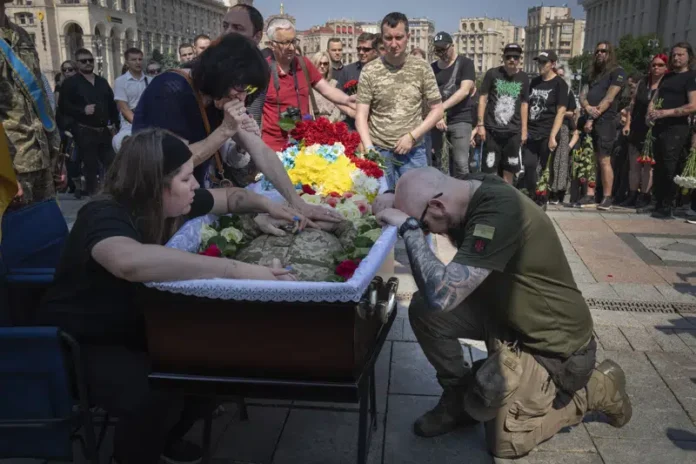KYIV, Ukraine AP)— Ukrainian air defenses managed to shoot down 32 out of 35 Shahed exploding drones launched by Russia early Tuesday, with most of them targeting the Kyiv region, according to officials. However, this bombardment highlighted significant gaps in Ukraine’s air protection after almost 16 months of war.
Russian forces primarily focused on the region surrounding the Ukrainian capital in a three-hour nighttime drone attack, resulting in approximately two dozen drones being intercepted by Ukrainian air defenses. The assault was part of a broader offensive that extended to regions as far west as Lviv near the Polish border.
The fact that the Shahed drones were able to reach Lviv indicates that air defense assets are insufficient to cover such a wide area, explained Yuriy Ihnat, spokesperson for the Ukrainian air force. Currently, air defense systems primarily safeguard major cities, crucial infrastructure, including nuclear power plants, and the front lines.
In the Lviv region, the Russian strike targeted a critical infrastructure facility, triggering a fire, according to Lviv Governor Maksym Kozytskyi. Additionally, Russia launched ballistic missiles on Ukraine’s southern Zaporizhzhia region.
Ukraine has received advanced weaponry from its Western allies, bolstering its air defenses and increasing the success rate of intercepting incoming drones and missiles. However, gaps in coverage still persist.
During a winter offensive, Russia previously damaged Ukraine’s power supply, although prompt repairs mitigated the impact of that attack.
The recent aerial assaults coincided with the early stages of a Ukrainian counteroffensive aimed at reclaiming territory occupied by Russian forces since the full-scale invasion in February 2022. However, the Ukrainian advance has encountered challenges, including heavily mined terrain and reinforced defensive fortifications, as noted by Valerii Zaluzhnyi, the commander-in-chief of Ukraine’s armed forces.
Intense battles are currently raging in eastern Ukraine, particularly in Bakhmut, Lyman, Avdiivka, and Marinka, according to the Ukrainian armed forces. Russia has shelled 15 cities and villages in the Donetsk region, causing injuries to civilians, including three in Chasiv Yar near Bakhmut, as reported by Ukraine’s presidential office.
Following the collapse of the Kakhovka Dam due to flooding in the Kherson region, Russia has relocated approximately 20,000 troops from that area. The flooding eliminated the need for Russian forces to defend more than 300 kilometers (180 miles) of the 1,000-kilometer (680-mile) front line, allowing Moscow to increase military density in the Zaporizhzhia and Donetsk regions where intense fighting is occurring.
According to military analyst Roman Svitan, it appears that the Ukrainian counteroffensive is focusing on the Zaporizhzhia region with the aim of breaking through Russia’s land corridor to the Crimean Peninsula, which was illegally annexed by Moscow in 2014.
Russia’s Foreign Intelligence Service (SVR) has invited Ukrainian diplomats stationed abroad, along with their families, to come to Russia and avoid returning to Ukraine. The SVR claims that many Ukrainian diplomats are unwilling to return home after their tours and are seeking refugee status in the European Union and Asian countries where they were stationed.
Russian Defense Minister Sergei Shoigu alleged that Ukraine plans to use U.S.-made HIMARS (High Mobility Artillery Rocket System) and U.K.-provided Storm Shadow missiles to attack Russian territory, including Crimea. He warned that employing such missiles outside the current war zone would result in immediate strikes on decision-making centers within Ukrainian territory. However, Shoigu provided no evidence to support his claim, mirroring earlier threats made by the Russian government against the deployment of other Western weapons.
Major General Kyrylo Budanov, Ukraine’s military intelligence chief, revealed on national television that Russia had planted mines in the cooling system of the Russian-occupied Zaporizhzhia nuclear power plant. Budanov cautioned that if the cooling system is destroyed, there would be severe consequences. While the claim couldn’t be independently verified, the plant’s six reactors are currently shut down but still require cooling.
The Russian State Duma, the lower house of parliament, approved a bill offering pardons to criminal convicts who join Russian forces fighting in Ukraine. The move is aimed at boosting troop numbers during the initial stages of Ukraine’s counteroffensive. Another bill passed by the Duma eases restrictions on volunteer soldiers, enabling ex-convicts to sign contracts with the military during a period of mobilization. The legislation will now proceed to the upper house of parliament before reaching President Vladimir Putin for final approval.
Even before the passage of this legislation, Yevgeny Prigozhin, the wealthy owner of the Wagner Group military contractor, has been recruiting criminal convicts as mercenaries, promising them pardons if they survive six months of fighting.






